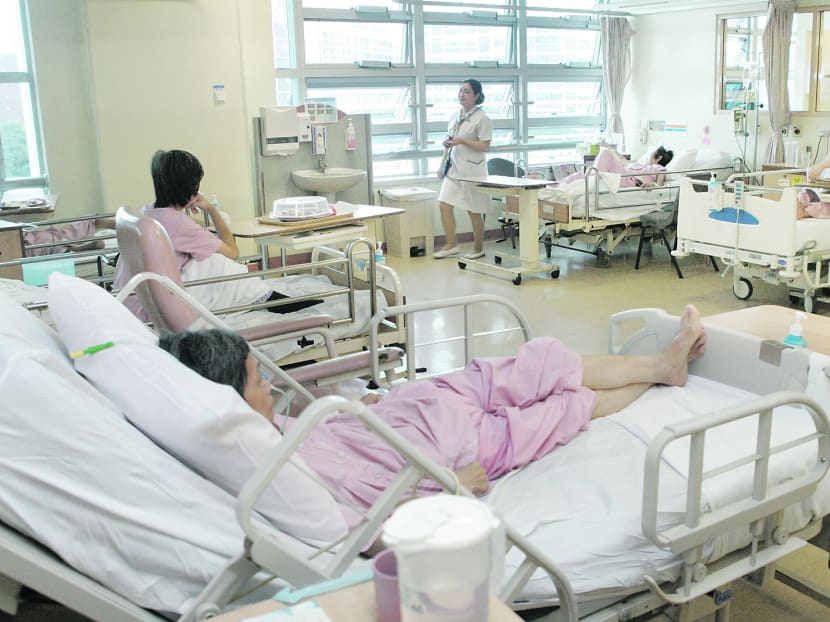MediShield Life to provide lifelong coverage
SINGAPORE — MediShield will undergo a major revamp to become a cradle-to-grave national basic healthcare insurance scheme, which will cover every Singaporean, even those who have pre-existing illnesses, and bring about lower out-of-pocket healthcare expenses, Prime Minister Lee Hsien Loong said yesterday.
SINGAPORE — MediShield will undergo a major revamp to become a cradle-to-grave national basic healthcare insurance scheme, which will cover every Singaporean, even those who have pre-existing illnesses, and bring about lower out-of-pocket healthcare expenses, Prime Minister Lee Hsien Loong said yesterday.
Once the details of these fundamental changes are worked out over the next year or longer, including a public consultation exercise by the Health Ministry that is expected in the months ahead, the scheme will be renamed MediShield Life to reflect the transformation into a lifelong and universal scheme.
Currently, MediShield, which 92 per cent of Singaporeans are under, does not cover those with pre-existing illnesses and after one turns 90. One can also opt out of the scheme.
Explaining the rationale for this “major change”, Mr Lee said people still worry about big hospital bills should they fall seriously ill — especially those who are over 90 or find it harder and more expensive to get insured because they are elderly or have pre-existing illnesses — although there were “very few” such cases in reality.
He cited how he did not find any from the 140 medical cases from his own Meet-the-People Sessions with “huge hospital bills”. The Ministry of Health found “very few” in its database.
To ensure Singaporeans have no need to worry about paying hospital bills, Mr Lee said: “We’ve thought about it long and hard, we’ve argued it, we decided we need to do it ... because it’s a very important step towards providing people protection and assurance that medical care — you can be taken care of.”
He added: “It will cover every Singaporean — old ones, young ones, those newly born, even those who are now outside the MediShield network, we will bring them back in. You may be elderly, you may have dropped out, you may have pre-existing illnesses, we will bring you back in. It may cost you a bit more, but it can be done.
“There will be no more opting out from MediShield.”
Changes to the MediShield scheme because premiums had become too high was one of the recommendations the Government Parliamentary Committee for Health had made in a paper it submitted last week. The scheme had undergone tweaks just earlier this year, including coverage being extended to up to age 90, instead of 85, as well as for in-patient congenital and neonatal conditions but premiums also increased in tandem. Those aged above 65, for example, had to pay up to S$21 more per month, although the Government also disbursed a one-off S$400 Medisave top-up.
Mr Lee said that “because benefits and coverage are better, MediShield Life premiums will be higher” because the scheme “has to break even” but gave the assurance that those who cannot afford the increases will be subsidised.
On how higher premiums can be managed, the idea of having younger Singaporeans pay more to “subsidise” the elderly again came up.
Said Dr Loke Wai Chiong, who is Director of Global Healthcare Practice at KPMG, an audit and advisory services firm: “One way is that the young should pay more, then pay less when they are older. Take the chance that those who can bear the greatest increases should be the young.”
Professor Phua Kai Hong of the Lee Kuan Yew School of Public Policy added that a flat premium structure was unlikely as young people would not be incentivised to take care of their health. He also suggested that the “younger elderly could cross-subsidise the older elderly” through a flat premium structure for those above age 65.
Healthcare financing experts also cautioned that this may lead to over-consumption of healthcare services or doctors to hawk unnecessary, expensive treatments. They also called for clear rules and guidelines for claims to be set.
Prof Phua said: “The hazard is when doctors induce demand, especially in the private sector. There’s going to be a lot of lobbying to have everything covered in private care. It is important to make sure we don’t induce further consumption.”
Dr Loke added that insurers had a role to play in curbing rising healthcare costs by not reimbursing claims in an uncontrolled manner.







